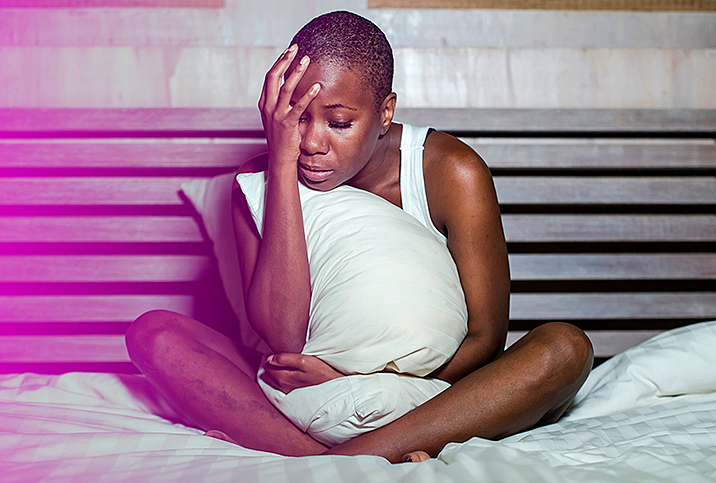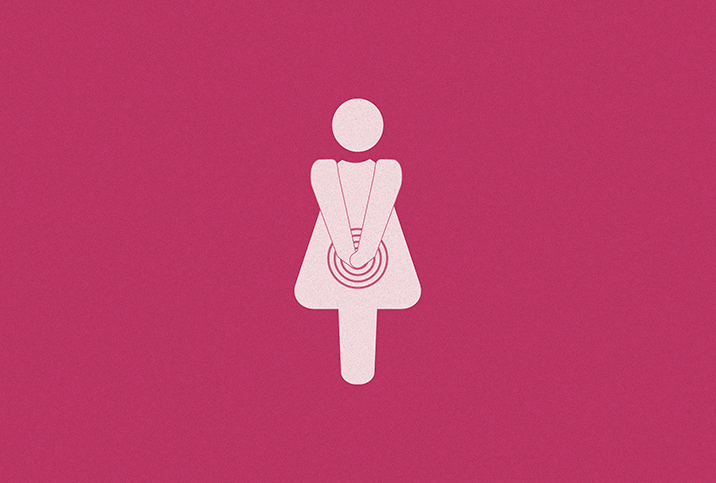Can Chronic Candida Cause Anxiety or Depression?

If you have a vagina, there's a strong probability you'll develop a yeast infection at some point, often during times of hormonal changes or after taking antibiotics. Yeast infections are caused when yeast that is normally present in the vagina starts overgrowing. This is why antibiotics frequently cause infections: They kill bacteria, including the good bacteria that help keep yeast balanced.
But what happens when yeast infections become chronic? Well, it turns out that in addition to taking a toll on the body, recurrent vulvovaginal candidiasis (RVVC) can take a major toll on mental health.
What is RVVC?
RVVC is defined (somewhat arbitrarily) as having four or more yeast infections a year.
"Symptoms of recurrent yeast infections may include vulva and vaginal itching, redness, swelling, thick, white, odorless, cottage-cheese-like discharge and/or pain during intercourse," said Gunvor Ekman-Ordeberg, an OB/GYN and co-founder of DeoDoc Intimate Skincare.
She adds that recurrent yeast infections can be brought on by pH changes, and hot and humid environments (usually paired with the wearing of synthetic pads, liners, underwear, leggings and more).
"Various oral contraceptives, antibiotics and pre-stage diabetes may be a cause, as well."
In addition to the physical discomfort (like having a paper cut and a mosquito bite in the vagina at once, as Barb Dehn, N.P. with El Camino Women's Medical Group, who goes by Nurse Barb, described it), RVVC has the potential to grow into a more serious condition, such as vaginitis. All the while, patients have reported effects on their mental health.
"I personally suffered with Candida, recurrent yeast infections, and crippling anxiety for over five years, and had become resistant to antibiotics," said Michelle Mayer, owner and editor-in-chief of Tidy Dog Mom. "Before my Candida overgrowth, I had almost no anxiety and could handle stressful situations and work well under pressure. However, after I started suffering from recurrent yeast infections, I noticed I also started having sudden panic attacks, which were quite scary." And while it may seem odd that something going on in the vagina can affect the brain, science says it can be true.
Is there a link between RVVC and anxiety, depression or mood disorders?
As with many aspects of women's health, the link between RVVC and mood disorders is not totally understood. One small older study of 28 women on the psychological factors associated with recurrent vaginal candidiasis from 1998 found that those who experience RVVC were "significantly more likely to suffer clinical depression, to be less satisfied with life, to have poorer self esteem, and to perceive their lives as more stressful."
A 2020 study out of Iran of about 100 women found that participants who experienced RVVC were more likely to report feelings of anxiety, depression and stress in the previous four weeks.
A yeast infection may not seem like a big deal—it may clear on its own, or respond to over-the-counter tablets, suppositories or creams. But RVVC is an entirely different beast than getting a mild yeast infection once every few years.
"We should not underestimate the negative psychological impact that RVVC has on a woman's life," Nurse Barb said. "It's not 'just a yeast infection.'" She added that in some cases, RVVC can lead to chronic vulvar and vaginal pain (vestibulitis)."
"After almost a year of getting a yeast infection every month, I really became depressed. Especially when you're young, Candida can really put a damper on your sex life and ruin relationships," Mayer said.
How does RVVC affect mental health?
In addition to a stalled sex life—yeast infections are not contagious, but no one wants to have sex when their vagina burns and itches, plus sex can aggravate symptoms—people may experience anxiety about when RVVC will flare up next.
Then there's the feeling, unfounded as it may be, that you're letting your partner down or that you're being judged by your healthcare provider, friends or partners when you discuss RVVC. Nurse Barb also mentioned that RVVC can cause feelings of hopelessness, mistrust in a doctor or provider's diagnoses and inability to concentrate and focus.
Is there a cure for RVVC?
Frustratingly, at present, there is no cure for RVVC, though symptoms can be managed. Doctors may prescribe an antifungal treatment or oral fluconazole for a period of six months to keep symptoms and flare-ups at bay. In some cases, boric acid may be recommended vaginally (but please do not eat it).
The mental health side of any chronic illness, including RVVC, is serious, but it can also be managed. Mayer, citing sky-high insurance costs, turned to natural remedies to help address her RVVC.
"After five years of consistent diet and lifestyle changes, along with natural remedies, I've found that I no longer suffer from panic attacks and my depression has faded as well," she said.
Nurse Barb said first she encourages patients to treat the infection with medical intervention, "then unpack the other issues that may also be influencing their psychological state, their relationships and their lives. There are many ways that women can feel better, from meditation, mindfulness and yoga to seeking therapy and counseling."


















